During times of struggle having support systems and qualified coping mechanisms can make a world of difference. Unfortunately, not everyone has these support systems and coping mechanisms. In these instances, it’s easy to turn to drugs and alcohol to cope with negative feelings and trauma. In the case of alcohol, those in crisis may drink to relieve stress and forget their problems. However, overusing alcohol as a coping mechanism can significantly increase the chances of alcoholism and alcohol abuse.
Many people are familiar with some of the negative consequences of drinking, whether it be a hangover, embarrassing oneself during heavy intoxication, or drinking to the point of blacking out. But these are all short-term consequences. In the long term, alcohol addiction can have irreversible side effects on the mind, body, and behavior. One such consequence comes in the form of wet brain. Let’s answer the question of “what is a wet brain?” and examine the treatments available for this condition. To learn more about Texas Recovery Center and our alcohol addiction treatment, call us at 844.230.5931.
What Is Wet Brain?
What is a wet brain? Wet brain is a brain disorder caused by a chronic thiamine deficiency. This deficiency is most often attributed to the prolonged use and overconsumption of alcohol. The name directly references the connection between wet brain and alcoholism. With that said, anyone can develop this disorder. However, it is much more likely to develop due to alcohol abuse. Wet brain contains two stages, each having its subset of symptoms.
Wernicke’s Encephalopathy
The first stage of wet brain is marked by confusion, vision changes, and decreased motor skills. Those suffering from Wernicke’s encephalopathy will have difficulty carrying out their daily routine and will struggle with activities such as walking and driving. This stage is considered temporary, although it can be quite severe.
Karsakoff’s Psychosis
Stage two is marked by continued confusion, impaired memory, and difficulty learning new skills. Also referred to as alcohol dementia, symptoms exhibit this consistently over time and can be irreversible. Those suffering from Karsakoff’s psychosis may display signs of retrograde amnesia while the symptoms from Wernicke’s encephalopathy continue to worsen.
Those who can identify wet brain in its first stage stand the best chance of recovery. That’s why fully understanding the signs and symptoms of a wet brain is essential.
Symptoms and Treatment of Wet Brain
Many other symptoms accompany this brain disorder. These include:
- Memory loss
- Loss of coordination
- Inability to access memories
- Drowsiness
- Abnormal eye movements
- Decreased body heat
- Increased risk of hypothermia
- Delirium
- Fatigue
- Hallucinations
- Inability to form new memories.
These symptoms create a vicious cycle as wet brain generates these symptoms, exacerbating the severity of the illness, making recovery a challenging process as the brain struggles to obtain the nutrients it requires. Unfortunately, there is no cure available for a wet brain. However, a recently available treatment can improve the symptoms of the first stage of wet brain. This treatment often consists of administering high doses of thiamine to replenish nutrients in the brain. Thiamine is given orally or intravenously and is often accompanied by vitamins and other supplements. Thiamine, however, becomes much less beneficial when treating stage two, as thiamine cannot help reverse memory loss.
Finding Help for Wet Brain and Alcoholism at Texas Recovery Center
There are no pleasant answers to the question, “what is a wet brain?” The longer the condition is left untreated, the more likely it will become untreatable. That is why it is necessary to recognize the signs of a wet brain and act before it’s too late. At Texas Recovery Center, we understand how complex the recovery process can be. Our staff is passionate and highly trained in treating addiction and wants nothing more than to provide excellent care for their patients. For more information on wet brain or to schedule an appointment today, contact us at 844.230.5931.












